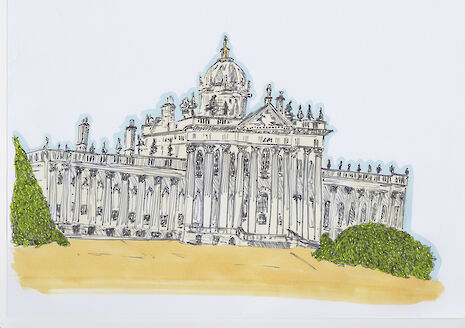A Very British Obsession
With the rise of period drama, the English country-house has become a ubiquitous icon of an idealised British heritage. Yet behind contemporary depictions, Isabella Cookson finds traces of a more troubling reality

It’s Sunday afternoon. The sky is characteristically grey; the soft threat of drizzle hangs in the air. Wellington boots are lined up and ready for a typical family outing to the local, preserved country-house. There is something strangely comforting about this typically British, middle class memory. The sensation that comes over me is akin to the one I get while dunking a digestive biscuit into a cup of tea, watching it go all soggy. Or how I feel when I eat sponge and custard: comforted, bored, curiously proud.
And all these emotions can be expressed no better than when I watch a good old period drama. The cold heart of Britain is made to pump with passion, the stiff upper lip melted at the rudeness of Mr Darcy or at the more shocking sight of poor old Mr Beebe running naked around the lake in A Room with a View. Pastoral scenes are built up on top of one another, panoramic shots of enormous houses are imposed upon us and intricate costumes display delicate human forms: the everyday bourgeois life in a rose-tinted glass. If not historically accurate, films like Elizabeth or Marie Antoinette, are at least a spectacle to behold.
Perhaps we see with frustration that the furniture in that scene wasn’t quite in keeping with the 18th century, yet we cannot cease the desire to step into their satin shoes. We know that leeches didn’t really heal (in fact they often aggravated) the ill, but we will them to heal the swooning Marianne. Females grasp for smelling salts in those rib-crushing, circulation-preventing corsets, but for some reason we want to wear the same. I would like to see myself as an empowered, intelligent female, but I sometimes I imagine myself in some long lost era, in which women had the political rights of an eight year old and a bustle attached to their backside. Why?
And indeed, when? For as much as anything, the feelings that we generally attribute to this image are more genre based than historically based. Does it matter if it’s in the Regency period or under the reign of Henry VIII? As long as the house is big, the servants are wearing frilly caps and the corset of the damsel in distress is tightened, it doesn’t seem to matter if there was a plague in London, a war in Spain or drastic change in the penal law that year. Or if it does, it is rarely the point. We are, in general, exposed to the parlour and even then not to the inane boredom that would have prevailed. The feelings that are evoked in us are not based upon a historically better past but an a-historical desire. We tap not so much into a deeper understanding of our forefather’s (and indeed mother’s) plights so much as our own romantic idealism. The country house acts as a metaphorical screen onto which we project our own desire for security, manufacturing an escape from our world of inescapable uncertainty and confused national identity.
The country-house is a quintessential image of a British past; one that embraces, in a microcosmic sense, the rich and the poor. But it is an image. Of course, many of our ancestors did actually live, work in or work around land surrounding country houses. This is partly why we all feel we have to right to an opinion on the subject, a claim on its authenticity. But the security it represents is a false one. People often died of diseases now easily preventable, marriages collapsed, wars were waged, poverty felt. The fears we have today could be felt then. The structure of the country house did not protect them from reality in same way it allows us to escape ours.
In her last novel Persuasion, Austen herself gazes beyond the nostalgic image of the country-house. Unlike her other heroines, Anne Elliot must “pay the tax of quick alarm” of being a sailor’s wife. She is not given a secure, elegant estate ruled by aristocratic values and tradition but the choppy, unpredictable sea.
The Englishman’s ideal home is a castle; with a comforting sense of structure and moat for protection. But the feelings unearthed in us are situated not in national memory, but in national imagination, on how we would wish it to be.
 Interviews / ‘People just walk away’: the sense of exclusion felt by foundation year students19 April 2024
Interviews / ‘People just walk away’: the sense of exclusion felt by foundation year students19 April 2024 News / Climate activists smash windows of Cambridge Energy Institute22 April 2024
News / Climate activists smash windows of Cambridge Energy Institute22 April 2024 News / Copycat don caught again19 April 2024
News / Copycat don caught again19 April 2024 News / John’s spent over 17 times more on chapel choir than axed St John’s Voices22 April 2024
News / John’s spent over 17 times more on chapel choir than axed St John’s Voices22 April 2024 News / Fitz students face ‘massive invasion of privacy’ over messy rooms23 April 2024
News / Fitz students face ‘massive invasion of privacy’ over messy rooms23 April 2024





